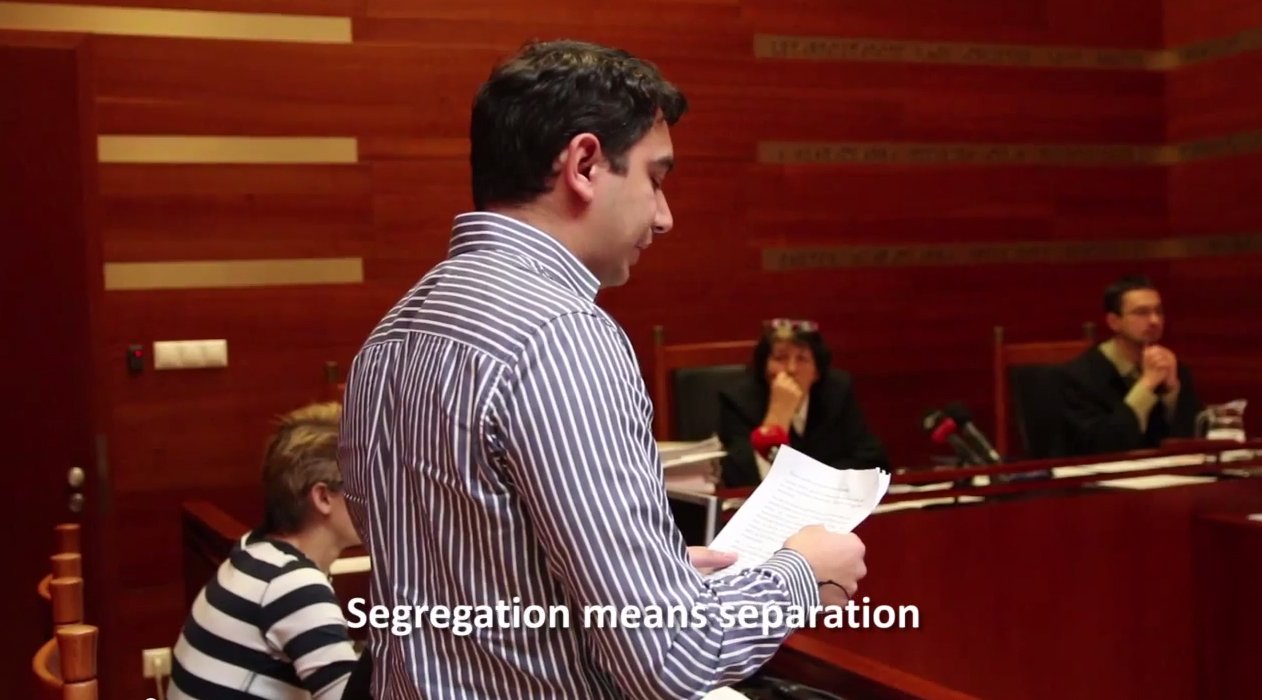“Without integration Roma might fall victim to new forms of slavery
14 January 2015
“Segregation can by no means be regarded as catching-up, nor it is a pedagogy of love,” said Attila Varga a young Romani activist for the Chance for Children Foundation (CFCF) when giving a speech in front of the Court of Appeals in November 2014 to stand up against school segregation at Nyíregyháza, a town in the Eastern part of Hungary.

He was referring to the words of Minister of Human Resources Zoltán Balog, who earlier stood as a witness in the same court case, in defence of the segregating school. The minister came out several times in favour of separated “catching-up education”, or “segregation with love”. He offered his support to the Roma-only school at the Romani settlement Guszev at Nyíregyháza that is operated by the Greek Catholic Church, and endorsed other all-Roma schools too.
The all-Roma primary school in question had already been closed down once by the municipality in 2007, when CFCF first started litigation against the segregating school. Then 6 other schools were made available in the city to integrate Romani pupils, and the city also provided free transfer buses from the Romani settlement to the inner city, as well as mentoring to assist the Romani children with integration. Many of those Romani pupils who then transferred to non-segregated schools managed to integrate successfully, and had a significantly improved chance to successfully complete their education.
Unfortunately, following a leadership change at the city council (the current governing party took over in 2010), the segregating school was re-opened in 2011 with the Greek Church as the operator (they were commissioned by the city council). As a consequence, most Romani children from the settlement started to go to this school again, which effectively halted the integration process.
That is when litigation against the segregating school was re-started; CFCF sued both the Church and the Hungarian state for introducing segregation. In February 2014, the court ruled in favour of the CFCF and established that segregating Romani children violates both Hungarian laws on equal opportunity as well as Hungary’s international commitments.
In November 2014, the Court of Appeals upheld the ruling of the first instance court and ruled against the segregating school. In its judgment, the Court of Appeals stated that it is illegal to educate Romani children separately even with the justification of the school being a church school, and ordered that new classes cannot be launched in the school anymore. The Hungarian courts thus took a firm stance against ethnic segregation of children. Unfortunately the ministry did not follow suit.
In reaction to the court decision, Minister Balog declared in a statement that the judgement only “enhanced his combative mood”, and the Ministry will find a way to legally allow for separated, “catching-up” education. The Ministry lost no time, a mere two weeks later it proposed an amendment to the National Education Act that basically created an opportunity to legally allow segregated education. Despite a concentrated protest effort by several civil society organisations and public actors, including the ERRC, the amendment was voted into law on 16 December in 2014. The ERRC in cooperation with CFCF and Romaversitas, sent a letter to the European Commission, calling on them to make sure the Hungarian Government adheres to its obligations under EU laws, and thus to urge the Government to withdraw these legal changes.
In the courtroom Attila described his own experiences, how much harm he and so many other Romani kids have suffered by having to attend Roma-only classes, and remarked that “segregation transmits poverty from generation to generation”. He concluded by quoting Pope Francis: “Without integration Roma might fall victim to new forms of slavery”.
You can watch Attila’s testimony before the court here.
You can read the text of the testimony of here.




